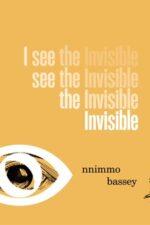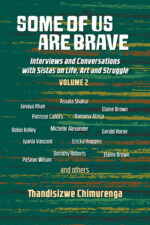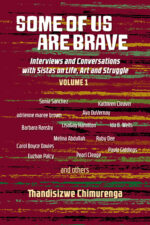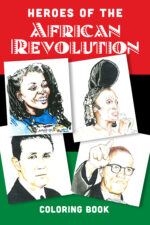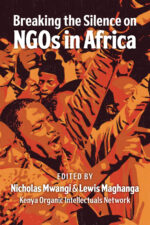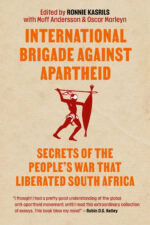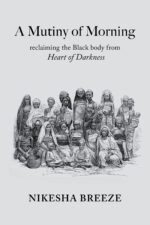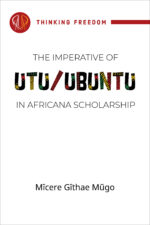- Please choose product options by visiting A Mutiny of Morning: Reclaiming the Black Body from <em>Heart of Darkness</em>.
-
I see the invisible
Author’s Note
Truth be told, I never thought I would write another volume of poetry after the last, I will not Dance to Your Beat (2011). The reason was that my previous volumes were reactive to the circumstances of the times. Patriots and Cockroaches (1992) was a reaction to the socio-political corruption that had engulfed Africa and dimmed the enthusiasm that had been built by the years of struggle for independence. Whereas we thought we were stepping into a post-colonial era, what we stepped into was a vicious neo-colonial times. The next collection, Poems on the Run (1995) was a reaction to military autocracy and the repression that followed. The volume was literally written underground. This was followed by Intercepted (1998) all written while detained at Kalakuta Republic of Alagbon Close. We Thought it was Oil But it was Blood (2002) responded to two things primarily – extractivism and the accompanying human and environmental rights abuses in the Niger Delta and elsewhere. The massive erosion of biodiversity and attacks on food sovereignty through the introduction of genetically modified organisms (GMOs) into our agricultural system inspired I Will not Dance to your Beat.
What you have in your hands, or on your screens, is a compilation that is largely more meditative than the previous collections. There are moments of reflection on the colonial and neoliberal foundations that permit a willful disconnection from nature and the resultant destructive extractivism.
Some of the poems came through conversations and poetry writing sessions with Peter Molnar, Maryam al-Khawaja — Rafto Human Rights laureates and Salil Tripathi, a member of the board of PEN International, in August 2017. The sessions held at a beautifully rustic location in Celleno, Italy, were documented on celluloid by the duo of Maria Galliana Dyrvik and Anita Jonsterhaug Vedå of SMAU, a multimedia firm in Norway. Poetic relationship with Maria and Anita has continued over the years and their work continues to inspire more and more poems.
We have also had time to ponder on the criminalization of environmental defenders and the burdening of victims with survival struggles with no life boughs. The poems were written over a wide span of time and require some pondering as poems often demand, of course. Although written over a broad time spectrum, they fall into identifiable themes. The harsh times that birthed the earlier volumes were blunted with doses of humour as poetry is largely therapeutic and contributes to our wellness and well-being.
In our communities, poetry and song are key tools for exposure of ills in our societies, for education and for rebuke. Poetry is an indispensable cultural tool with which we laugh at the wicked and add the needed bounce to our steps as we march on to end ecocide and give our people and other beings a chance to retain our being.
The call of this volume is that we must ensure that we see the invisible and hear the inaudible.
Nnimmo Bassey
Contents
Dedication
Author’s Note
OUR SOUL
Mother Earth our Teacher
Scarified and sacrificed
The Womb of the Earth
Choked by Convenience
I’m Not Afraid
I come from the future
Recent Ancients Foretold
Horizon
The Other Side
I like those bridges
Rising Smoke
Secured
Static Drip
Aloof
OUR INSPIRATION
Love
Gratitude
There is beauty
Twilight
Duty Bound
I Have Been in Motion
Barricades
Hill Huggers
Swamp buggies
Bumping into the Wind
Mangled Mangroves
Rainbows on the Sea
Stilts and Wiggles
The Stump I So Loved
Contemplation
Beads of Inspiration
Time Comes
Astonished monkeys
Seducing the Bees
The lands we fight to own
Tenants of Furious Times
OUR SIGHT
I see the invisible
Power!
Portals of Greed
Looter’s Boulevards
Cast a Vote
Political Will
This hate does not define us
OUR TIME
We Planted a Flag
Welcome to the age of paradox
Encrypted
By Me We Spoke
After Oil We Flourish (The Niger Delta isn’t a ticking ecological time bomb)
A Dirge for Fossil Capitalism
Return to Being
Python songs
Becoming Clearer
Riding the Waves of Time
When You Clock 6 and 2
Rainbows Through the Tears
Climate Debt Long Overdue
Poetry in the time of pandemic
We must breathe again
Net Zero Comes to Zero
Dreadful Liars On Heartless Shores
We are Seeds
Living Earth
We can plant a seed
In the Shadows of the Future (For Jay Naidoo & Stephen Pittam)
What is in that Barrel?
No More Sins to Confess
Pavements of Shame
Dawn in Celleno
Lago di Bolsena
OUR MIND
Ubuntu
Cloud
No vantage points
Memories
I Catch Myself
Holding my Peace
Dreams Dissolved
Traps Sold on Lies
Wicked Genes
Sinsibere
If the Sun Slept
-
“Not Bad for a N—, No?” / «Pas mal pour un N—, n’est-ce pas? »
Written during the seventy-fifth anniversary celebrations of the publication of Frantz Fanon’s Peau noir, masques blancs (“Black Skin, White Masks”), “Not Bad for a N—, No?” offers reflections on the circumstances of the publication of this classic work with Fanon’s insights on what he called the attempted “murder of man” and the urgent need for humanity to become “actional.”
Écrit lors des célébrations du soixante-quinzième anniversaire de la publication de Frantz Fanon de Peau noir masques blancs, «Pas mal pour un N—, n’est-ce pas? » offre des réflexions sur les circonstances de la publication de cette œuvre classique avec les idées de Fanon sur ce qu’il a appelé la tentative de «meurtre de l’homme» et le besoin urgent que l’humanité devienne «actionnelle».
-
International Brigade Against Apartheid: Secrets of the People’s War That Liberated South Africa
USD $ 27.00Edited by Ronnie Kasrils with Muff Andersson and Oscar Marleyn.
First published by Jacana Media (Pty) Ltd in 2021, ISBN: 978-1-4314-3202-8, this Daraja Press edition is available in North America and East Africa
I thought I had a pretty good understanding of the global anti-apartheid movement until I read this extraordinary collection of essays. This book blew my mind!
—Robin D.G. KellyWe hear for the first time from the international activists who worked secretly for the ANC’s armed wing, Umkhonto we Sizwe(MK), in the struggle to liberate South Africa from apartheid rule. They acted as couriers, provided safe houses in neighbouring states and within South Africa, helped infiltrate combatants across borders, and smuggled tonnes of weapons into the country in the most creative ways. Driven by a spirit of international solidarity, they were prepared to take huge risks and face great danger.
-
A Mutiny of Morning: Reclaiming the Black Body from Heart of Darkness
Nikesha Breeze has taken pages from Joseph Conrad’s Heart of Darkness, taken his words, and forced them to leave his colonized mind. She has made the words her own in poetic form. She illuminates the invisible Black voices inside, a radical, surgical, and unapologetic Black appropriation, at the same time as a careful birthing and spiritual road map. The resulting poems are sizzling purifications, violent restorations of integrity, pain, wound, bewilderment, rage, and, sometimes, luminous generosity.
The violent, scathing white supremacy of Joseph Conrad’s Heart of Darkness is traversed page by page and word by word in this brilliant prayer/poem—a work of reclamation, redemption, rescue, and repossession. — Wende Marshall, co-editor Insurrectionary Uprisings: A Reader in Revolutionary Nonviolence and Decolonization

